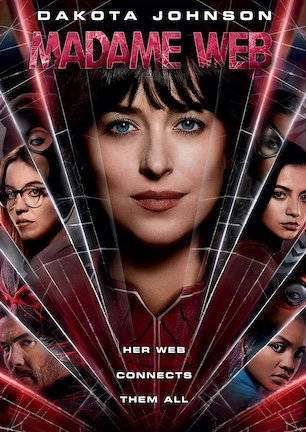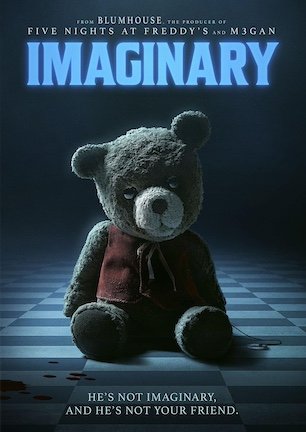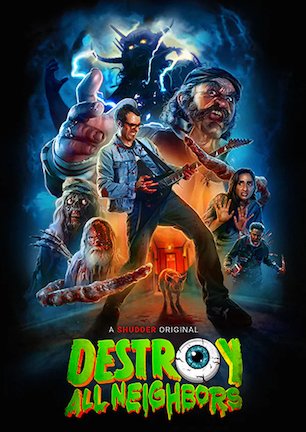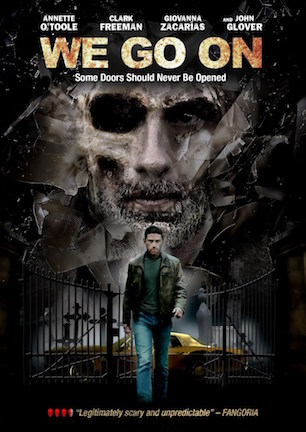Studio: Uncork’d Entertainment
Director: Bruce McDonald
Writer: Tony Burgess, Patrick Whistler
Producer: Jesus Gonzalez-Elvira, Amber Ripley, Sebastian Schelenz
Stars: Stephen McHattie, Henry Rollins, Juliette Lewis, Lisa Houle, Morgan Csarno-Peklar, Themis Pauwels, Astrid Roos, Hana Sofia Lopes, Tomas Lemarquis
Review Score:
Summary:
A hitman’s assignment to acquire a trumpet player’s pinky finger has unusual consequences on a vampire’s strange wedding plans.
Review:
Usually when I can’t make up my mind on a movie, I go with a 50/100 review score to reflect how a coin flip could land either way. “Dreamland” begs for this treatment. Its muddled mash of stream of consciousness style epitomizes a decidedly divisive “love it or hate it” deal. Those in the latter category will find the bizarre blend of dreamy drama and weirdo flourishes tiresomely purposeless. Admirers will assure them the film’s focus deficit brims with metaphors meant to mirror the sleepy, smoky, scattered nature of jazz music built into the backdrop.
I can’t tell for certain how much of the exploratory artiness might be deliberately directed or how much of it owes to improvisation. I am fairly certain that when any line related to “Dreamland” divides, more viewers will find their perspective falling on the negative side than the positive.
Since “Dreamland” runs all over the map in most regards, perhaps the simplest way to start looking at the film should involve summarizing the story’s gist. Stephen McHattie stars as Johnny Deadeyes, a hitman wearing what is so obviously a wig, I’m not sure if “Dreamland” intends for him to be a hitman in a wig or if the appliance is just that awful.
McHattie also plays a heroin-addicted music maestro annoyingly referred to only as “the trumpet player.” Knowing McHattie plays dual roles puts you a step ahead of where I was when I went into the film. “Dreamland” starts with a five-minute sequence where we follow the arcs of multiple people. All of them swiftly end up executed, putting a dot on the question mark over what those five minutes were worth. That’s one way “Dreamland” frustrates. It introduces characters and concepts with next to no context and leaves it to guesses to divine what’s what. That includes figuring out McHattie plays two people, which isn’t immediately obviously.
Well, unless you go by his different hair lengths. Yet when you figure he must be wearing a wig to begin with, it’s not unreasonable to wonder if they are two identities, not two separate men.
Anyway, Johnny works for Hercules, a semi-glitzy crime boss who’s a cross between a UFC fighter and a glittery promoter who might book his bout. Henry Rollins hits one of “Dreamland’s” high notes with his amusingly engaging performance. It’s refreshing to see him playing a legitimate personality with some exaggerated color instead of another brooding or xenophobic street type seemingly ready to explode a rage bomb at the drop of a pin. It’s also a reminder that when Rollins is right for a part, as he is here, his specific talents don’t have to stretch outside his wheelhouse like they do with some roles.
The trumpet player inadvertently insulted Hercules by forgetting his name while signing an autograph. As Hercules sees it through his twisted eyes, a little lesson in love is the only way their friendship can move past the slight. That’s where Johnny comes in. Hercules wants him to bring back the pinky finger from the trumpet player’s right hand.
In return, Johnny wants Hercules to give him a girl named Olivia. Johnny wasn’t pleased at all upon discovering Hercules sent him to assassinate several pedophiles simply so Hercules could control their child trafficking ring. Johnny’s distaste grew sourer when he learned a girl from his building was among the kids taken. Her little brother’s pleading brought Johnny a change of heart. Now he wants to bring Olivia home.
A major problem stands in the way. Olivia was already promised to a vampire, and their wedding is mere hours away. Adding complication upon complication, the vampire is the brother of The Countess, and her authority over the area makes her power both feared and revered. Pulling off a rescue will involve not only disrupting the nuptials, but befriending a pawnbroker, getting help from a sympathetic showgirl, and staying away from a gang of pint-sized schoolboys running enforcer duties for Hercules. Did I mention the trumpet player is a prisoner in the countess’ castle because he’s performing at the reception?
All of that seems alluringly loony in theory but plays out surprisingly plainly in practice. I want to see the movie I just recapped, except I already have and it wasn’t even close to being as enjoyably boffo as it sounds.
Even though that’s the setup, it doesn’t really describe the movie. Like its namesake environment, “Dreamland” deals in flashbacks, random cutaways to innocuous imagery, and nonsense bits of narrative. Rather than resulting in David Lynchian disorientation however, “Dreamland’s” jargon juggles a bunch of jumbled pieces that make a mess more than they ever mesh.
Playing the vampire like a live-action caricature complete with bug eyes and a lasciviously lapping tongue, Tomas Lemarquis seems to have been told he was in an episode of “What We Do in the Shadows.” Juliette Lewis was told to do whatever she wants. Lewis’ countess regularly whirls around wildly with her arms extended, doing expressive monologue bits while making reception preparations like she detoured out of “The Naked Gun.” No one else acts like they’re in a comedy, making these stabs at humor awkwardly out of whack with a dominantly dour tone, particularly when child sex trafficking is part of the movie’s menu.
In one scene, a cat knocks over a wine bottle. McHattie moves to right the bottle but instead takes a calm drag on his cigarette and stares contemplatively at his reflection rippling in the cabernet puddle. That’s a literary-like sequence that works in a novel, but seems strange to conceive in such detail for a motion picture depiction.
Circling back to the coin comparison, how does one make heads or tails of toes dipping in themes about duality, soul searching, personal sacrifice, and so on? Is there unspoken symbolism behind details like Hercules working out of a club called Al Qaeda? Why does “Dreamland” include recurring instances of vomiting, drag queens, and maids dolled up like vaudeville flappers? Does the movie just want to be colorful or do such elements play into commentary about putting up artificial appearances? If so, what exactly is the message?
Or is the film only an exercise in literally illustrating the figurative concept of the title? Decide what you will because I suspect the creators never made any conscious commitments themselves, rendering all answers nether right nor wrong. It also renders the movie’s intentions moot since the experience only has the definition an individual assigns it. In this case then, the reasonable grade to go with is 45/100, because the fence erected across unquantifiable entertainment and artistic value will still put more viewers on one side than the other.
Review Score: 45







If you want to see impossible amounts of blood explode crimson colors like the world’s worst version of a gender reveal, well, “Abigail” at least has that.